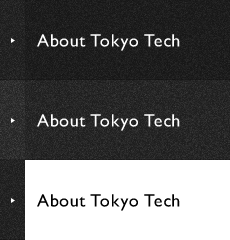Certified Evaluation and Accreditation of Professional Graduate Business Schools
In FY 2024, Institute of Science Tokyo (Science Tokyo) underwent the certified evaluation and accreditation of professional graduate business schools by the Japan University Accreditation Association (JUAA). The Institute was found to satisfy all standards specified for evaluation and accreditation of professional graduate business schools in March 2025.
In FY 2009, FY 2014, and FY 2019, Tokyo Institute of Technology (Tokyo Tech) — Science Tokyo’s predecessor — underwent the abovementioned evaluation and accreditation, and was found to satisfy all specified standards in the respective fiscal years.
Refer to the self-assessment and evaluation report for detailed information for FY 2009, FY 2014, FY 2019, and FY 2024.
[For reference] About the Evaluation and Accreditation System
In FY 2004, an evaluation and accreditation system was introduced by which all national, public, and private universities in Japan are required to undergo periodic evaluation of their education and research activities by a third-party evaluation and accreditation organization certified by the Minister of Education, Culture, Sports, Science and Technology (MEXT) (School Education Act, Article 109, paragraphs (2) and (3) and the Ordinance for Enforcement of the School Education Act, Article 40).
The evaluation and accreditation system:
-
Assures the quality of universities
-
Discloses evaluation results so that universities can be evaluated by the public
-
Provides evaluation results that enable universities to take the initiative in making improvements to enhance the quality of education and research activities.
There are two evaluation and accreditation systems:
The Certified Evaluation and Accreditation of Universities (conducted once every seven years), which evaluates the overall condition of a university's education and research, organizational administration, and facilities and equipment, and the Certified Evaluation and Accreditation of Professional Graduate Schools (conducted once every five years), which evaluates the condition of curricula, academic staff organization, and education and research activities of professional graduate schools.
- *
-
Note: Refer to the Japan University Accreditation Association for detailed information on the evaluation and accreditation system .
FY 2024 result of Certified Evaluation and Accreditation of Professional Graduate Business Schools
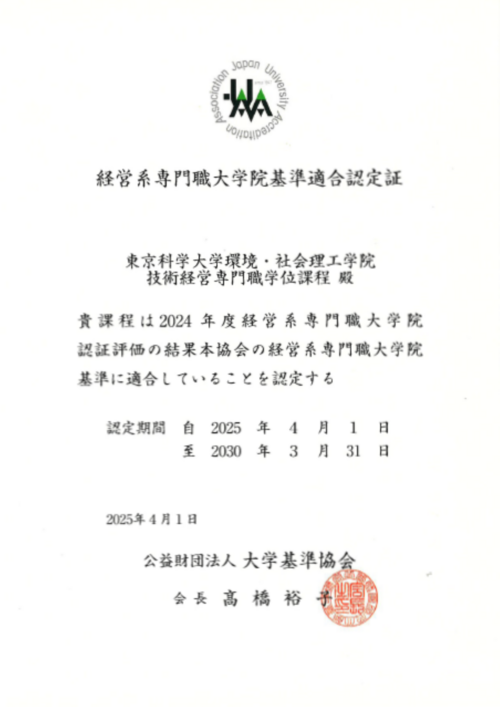
The School of Environment and Society’s Technology and Innovation Management / Innovation Science program at Science Tokyo, a professional graduate business school specializing in management of technology (MOT), underwent certified evaluation and accreditation of professional graduate business schools by the Japan University Accreditation Association (JUAA) in FY 2024. It was found to satisfy the standards specified by JUAA for evaluation and accreditation of professional graduate business schools, and received accreditation on March 14, 2025 (valid for the period from April 1, 2025 to March 31, 2030).
The Evaluation Report states that the School of Environment and Society’s Technology and Innovation Management / Innovation Science program is a leader of MOT education and research in Japan, and discusses the merits of the program.
In light of the evaluation results, the School of Environment and Society’s Technology and Innovation Management / Innovation Science program will continue to fulfill its mission of fostering all-round business leaders who contribute to the development of industry and society through the practice of technology management, maintain a broad perspective and high ethical standards when applying science and technology, and make responsible decisions based on their own logic that is built on facts, and will continue to contribute to the development of MOT education in Japan.
Overall evaluation (excerpt)
The School of Environment and Society’s Technology and Innovation Management / Innovation Science program at Science Tokyo is already examining and improving various issues, and is expected to continue with improvements while utilizing the results of this Certified Evaluation and Accreditation of Professional Graduate Business Schools. Science Tokyo is also expected to expand the distinctive characteristics of its MOT-specialized education program while achieving further progress in realizing its mission of cultivating leaders who create innovation.
Criteria discussed as merits of School of Environment and Society’s Technology and Innovation Management / Innovation Science program
- *
-
Note: Refer to the Japan University Accreditation Association for detailed information on the evaluation and accreditation system.
FY 2019 result of Certified Evaluation and Accreditation of Professional Graduate Business Schools
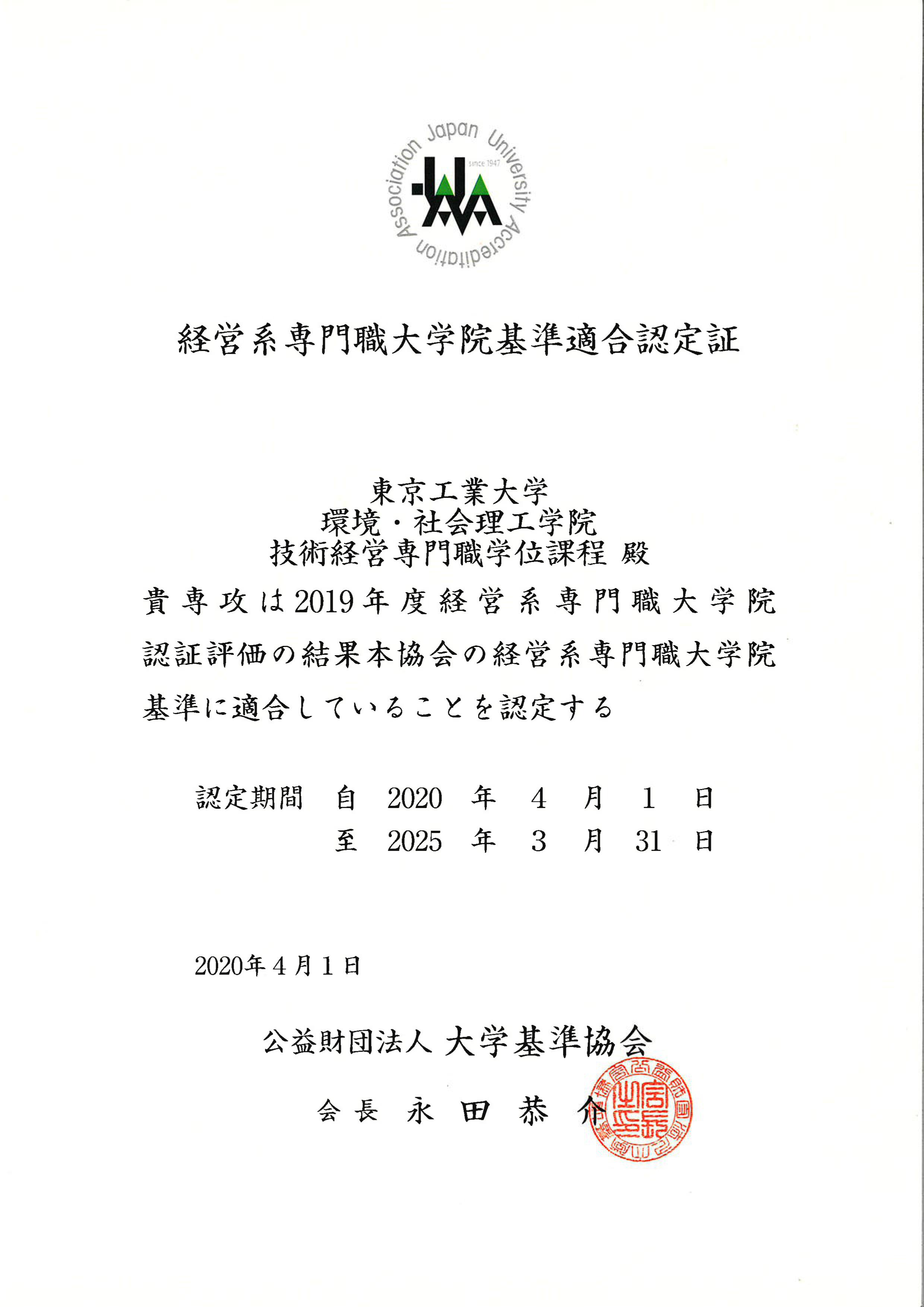
The School of Environment and Society’s Technology and Innovation Management / Innovation Science program at Tokyo Institute of Technology, a professional graduate business school specializing in management of technology (MOT), underwent certified evaluation and accreditation of professional graduate business schools by the Japan University Accreditation Association (JUAA) in FY 2019. It was found to satisfy the standards specified by JUAA for evaluation and accreditation of professional graduate business schools, and received accreditation on March 12, 2020 (valid for the period from April 1, 2020 to March 31, 2025).
The Evaluation Report states that the School of Environment and Society’s Technology and Innovation Management / Innovation Science program is a leader of MOT education and research in Japan, and discusses seven merits of the program.
In light of the evaluation results, the School of Environment and Society’s Technology and Innovation Management / Innovation Science program will continue to fulfill its mission of fostering practical innovation leaders who develop their own theories and contribute to the development of industry and society by utilizing science and technology, and will continue to contribute to the development of MOT education in Japan.
Overall evaluation (excerpt)
By continuously making improvements and reforms to further refine its characteristics, the School of Environment and Society’s Technology and Innovation Management / Innovation Science program at Tokyo Institute of Technology is expected to continue to lead Japan's MOT education and research, and to share its results with the world.
Criteria discussed as merits of School of Environment and Society’s Technology and Innovation Management / Innovation Science program
- *
-
Note: Refer to the Japan University Accreditation Association for detailed information on the evaluation and accreditation system.
FY 2014 result of Certified Evaluation and Accreditation of Professional Graduate Business Schools
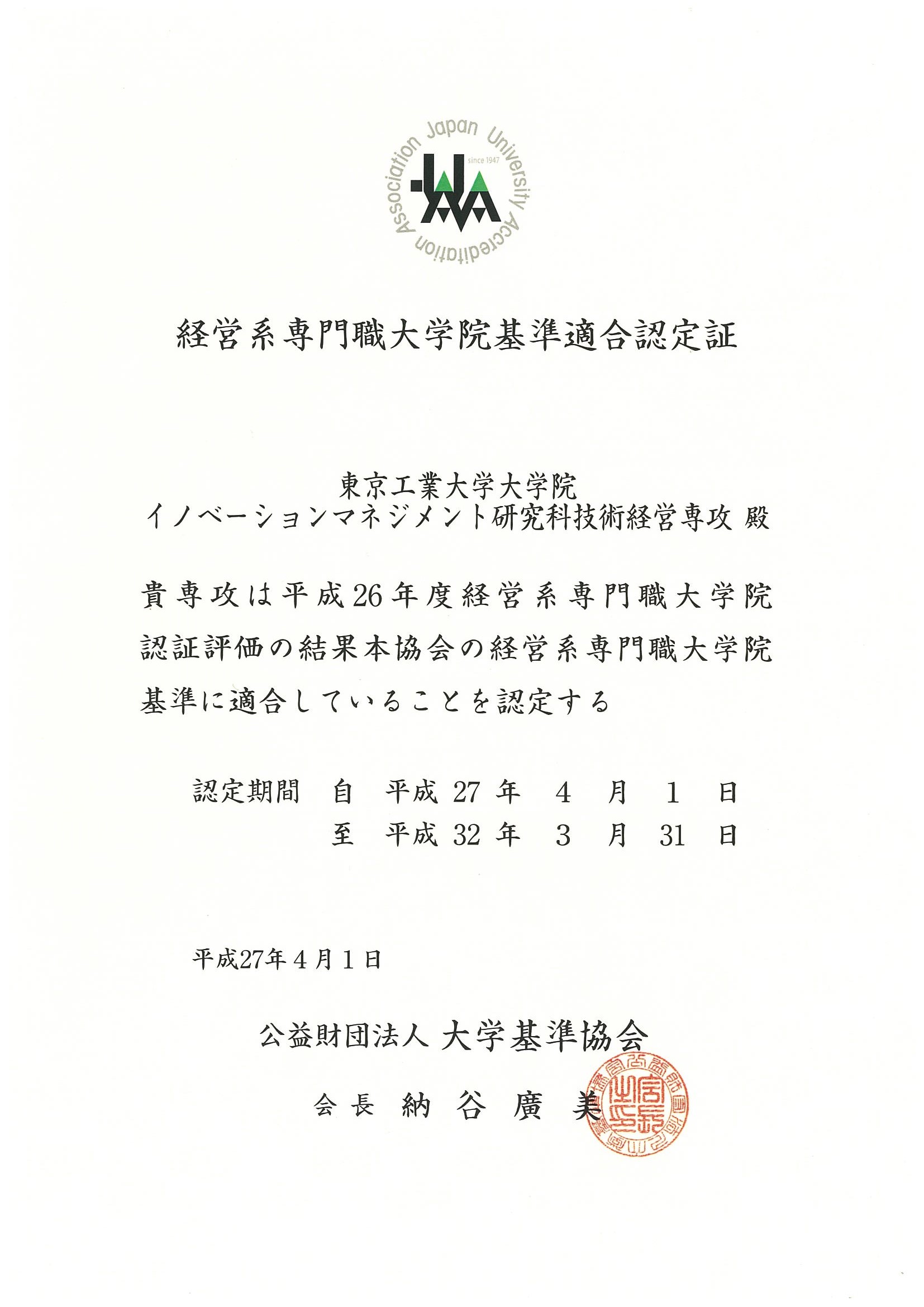 The Tokyo Institute of Technology Graduate School of Innovation Management, a professional graduate business school specializing in management of technology (MOT), underwent certified evaluation and accreditation of professional graduate business schools by the Japan University Accreditation Association (JUAA) in FY 2014. It was found to satisfy the standards specified by JUAA for evaluation and accreditation of professional graduate business schools, and received accreditation on March 20, 2015 (valid for the period from April 1, 2015 to March 31, 2020).
The Tokyo Institute of Technology Graduate School of Innovation Management, a professional graduate business school specializing in management of technology (MOT), underwent certified evaluation and accreditation of professional graduate business schools by the Japan University Accreditation Association (JUAA) in FY 2014. It was found to satisfy the standards specified by JUAA for evaluation and accreditation of professional graduate business schools, and received accreditation on March 20, 2015 (valid for the period from April 1, 2015 to March 31, 2020).
The Evaluation Report states that the Graduate School of Innovation Management is a leader of MOT education and research in Japan, and discusses seven merits of the graduate school.
In light of the evaluation results, it is the intent of the Graduate School of Innovation Management to contribute to MOT education in Japan by continuing to strive to offer MOT courses that fulfill the objective of the professional degree program. The mission of these courses is "to bring a global perspective and high ethical standards to the nurture of talented people who are capable of playing an active role as leaders in innovation management."
Overall evaluation (excerpt)
By continuously making improvements and reforms to further refine its characteristics, Tokyo Institute of Technology Graduate School of Innovation Management is expected to continue to lead Japan's MOT education and research, and to share its results with the world.
Criteria discussed as merits of Graduate School of Innovation Management
- *
-
Note: Refer to the Japan University Accreditation Association for detailed information on the evaluation and accreditation system.
FY 2009 result of Certified Evaluation and Accreditation of Professional Graduate Business Schools
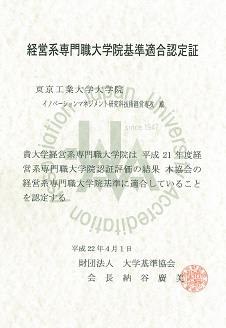
The Tokyo Institute of Technology Graduate School of Innovation Management, a professional graduate business school specializing in management of technology (MOT), underwent certified evaluation and accreditation of professional graduate business schools by the Japan University Accreditation Association (JUAA) in FY 2009. It was found to satisfy the standards specified by the JUAA for evaluation and accreditation of professional graduate business schools, and received accreditation on March 12, 2010 (valid for the period from April 1, 2010 to March 31, 2015).
The Graduate School of Innovation Management received a high overall evaluation by the JUAA.
The Evaluation Report states that the Graduate School of Innovation Management is "a leader of MOT education in our country," and discusses six merits of the graduate school.
In light of the evaluation results, it is the intent of the Graduate School of Innovation Management to contribute to MOT education in Japan by continuing to strive to offer MOT courses that fulfill the mission of the professional degree programs. The goal of these courses is "to bring a global perspective and high ethical standards to the nurture of talented people who are capable of playing an active role as leaders in innovation management."
Overall Evaluation (excerpts)
For many years, Tokyo Institute of Technology has made notable achievements that have placed it at the core of engineering education in Japan. It is expected to utilize its advanced management resources to the fullest extent and play an ever more active role as a leader in MOT education in Japan.
The following criteria are discussed as merits of the Graduate School of Innovation Management
- *
-
Note: Results of the certified evaluation and accreditation are published on the website of the Japan University Accreditation Association.
. Any information published on this site will be valid in relation to Science Tokyo.




 The
The 
